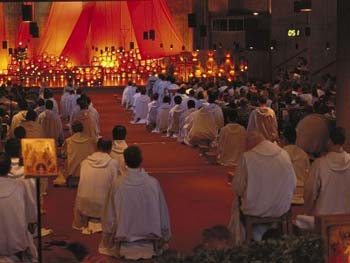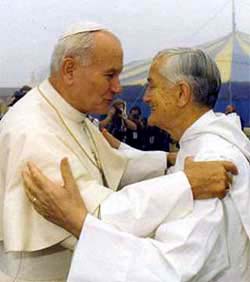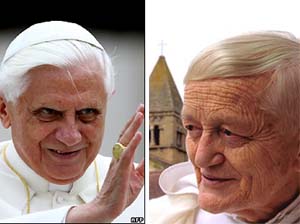The Community of Taizé is well known worldwide, but because American Catholicism is quite insulated, I will say a few words about it for those who do not know exactly what it is. Taizé is a joint Protestant and Catholic “monastic order” in the Burgundy region of France.

Seating Muslim style at a Taizé prayer session |
On their official website – in 62 languages - they call themselves a “parable of community,” Catholic and Protestant brothers living and praying together, overcoming every barrier of religion and culture. Since they profess no true faith, the aim is not to convert anyone to anything, but rather to be “a presence of love” wherever they find themselves, especially among the poor and the marginalized groups of society.
Taizé, which started even before Vatican II, became a pioneer of ecumenism and a model of the future community desired by Progressivism. Paul VI, John Paul II and Benedict XVI have all heartily approved that establishment where Catholicism and Protestant, orthodoxy and heresy, are boldly blended.
It was founded by Protestant preacher brother Roger Schutz, who never became Catholic, according to the community’s own members. In fact, Schutz himself affirmed until his untimely end that he had never “converted” (that wasn’t necessary); instead, he had “integrated” or amalgamated Catholic beliefs into his Calvinist heresies.

A constant support from the conciliar Popes |
Regardless of the absurdity of that claim, at the funeral Mass of John Paul II in April 2005, shortly before he was elected Pope, Card. Jospeh Ratzinger gave ‘brother’ Schutz Communion. Later it came to light that Schutz had received Communion from John Paul II on various occasions.
On August 16, 2005, Schultz was stabbed and killed by a mentally deranged woman during a prayer session at the Taize community. No one less than the Vatican official in charge of ecumenism with Protestants, Cardinal Walter Kasper, “presided” at his funeral, where Catholics and Protestants all received Communion.
As one sees, what Taize represents is the syncretism of religions. Was Brother Schutz Catholic or Calvinist? What is certain is that he was not a Catholic, which is what matters. He was a “kind” man who set aside all doctrinal differences as if truth were a secondary concern. He is the post-Vatican II model of “religious unity,” just as his community represents an ideal future community according to conciliar teachings.
Benedict sends message of praise
This month, five years after his death, the Vatican paper, L’Osservatore Romano, printed a front page tribute to “Brother Schutz” from Cardinal Tarcisio Bertone, Vatican Secretary of State. On behalf of Pope Benedict, he praised Schultz as an “untiring witness of Gospel peace and reconciliation.”
His effusive eulogy included placing Brother Roger in Heaven interceding for us: “Brother Roger was a pioneer on the difficult path toward the unity of the disciples of Christ. Now that he has entered into eternal joy, he continues to speak to us. His testimony of an ecumenism of holiness can inspire us on our path towards unity.”

Ratzinger decided: Schutz ‘entered into eternal joy’... |
Pope Benedict wants to express his “spiritual closeness” to Taizé, Bertone wrote, and his “union in prayer.” He then affirmed the Vatican hope that the syncretist Taizé community should "grow and radiate its charism in a special way among the young generations.” It is nothing less, in my opinion, than an open invitation for young Catholic men to enter this ecumenical “monastic community.”
When he wants to attack Capitalism, Benedict speaks against the dangers of relativism that it generates. His effusive praise of Schutz however, is a direct contradiction to such laments, establishing him as a promoter of relativism and syncretism.
With Pontiffs giving Brother Schutz Holy Communion and approving the Protestant/Catholic sharing of the Eucharist at Taize, it is no wonder that today we are seeing Catholics and Protestants, Muslims and Jews all invited to the “table” at Novus Ordo Masses around the world. If Schutz made it to Heaven without converting to the only true Faith, this makes a mockery of extra Ecclesiam nulla salus and renders the missionary mark of the Church futile.
Certainly, Benedict’s recent eulogy of Taizé increases the general confusion about the teachings of the Catholic Faith.
Posted August 18, 2010

|